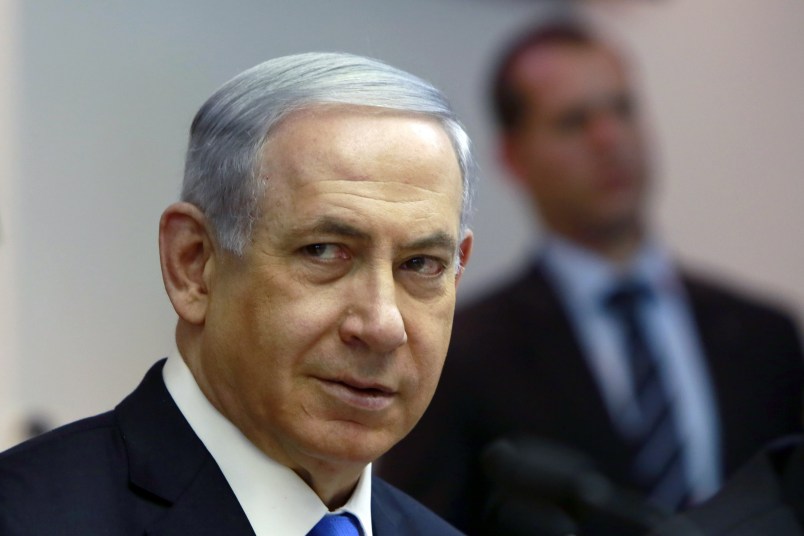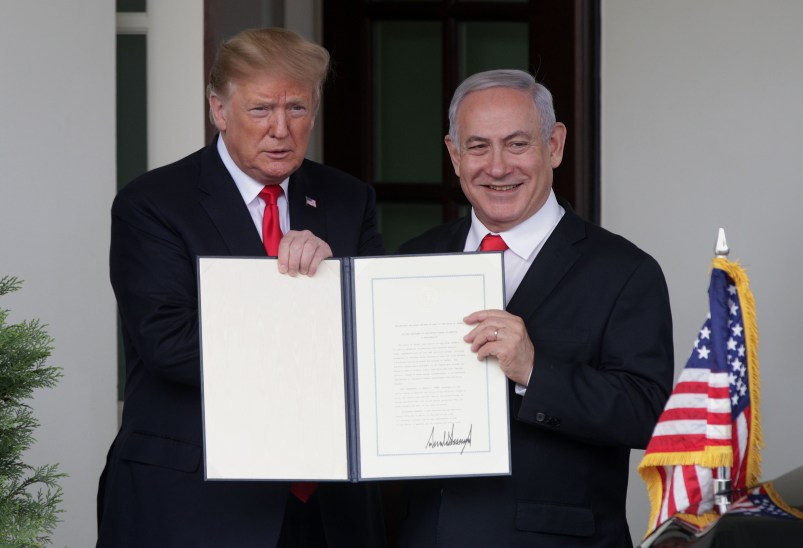JERUSALEM (AP) — Arab political leaders in Israel on Tuesday rejected Prime Minister Benjamin Netanyahu’s apology for comments he made in last week’s national elections that offended members of the Arab community and said his words made him unsuitable to return for a third consecutive term on the job.
The spat has touched on longstanding claims of discrimination by Israel’s Arab minority, which makes up 20 percent of the Jewish state, and signaled that the rift will not be healed anytime soon. An Arab advocacy center in Israel said the country’s national elections brought an “unprecedented level of racist incitement” against the minority community.
In the heat of a close race last week, Netanyahu posted a video on his Facebook page where he implored his hard-line supporters to head to the polls, saying that “left-wing organizations” were bussing Arabs to the polls “in droves.” The comments drew accusations of racism from Arab voters and a White House rebuke.
Netanyahu told a gathering of Arab dignitaries Monday, “I know that what I said a few days ago offended some of Israel’s citizens, offended Israeli Arabs. I had no intention of doing so. I am sorry for this.”
But Arab politicians from the Joint List — a new coalition of mostly Arab parties — said they were not invited to the gathering at the prime minister’s residence.
“Why didn’t he call us? Why didn’t he invite us?” said Ayman Odeh, head of the Joint List.
There was no immediate comment from Netanyahu’s Likud party.
Arab politicians said his election victory was illegitimate, claiming Netanyahu won the vote by pandering to anti-Arab fears.
“We call on Netanyahu to return the mandate he received on the basis of incitement and fear-mongering,” the Joint List said in a statement. Netanyahu has secured a majority of backers in the new parliament and is expected to be formally tapped on Wednesday to form the next government.
Opinion polls conducted on the eve of elections showed Netanyahu’s conservative Likud party trailing behind his main challenger, the center-left Zionist Union. His sudden turnaround victory came as Netanyahu made his remark about Arab voters in the final hours of voting.
His comments on Arabs, along with a declaration that he would not allow the establishment of a Palestinian state on his watch, have infuriated the White House. And his attempts to backtrack on both positions have been greeted with skepticism.
“We just don’t know what to believe at this point,” State Department spokeswoman Marie Harf said Monday.
The controversy comes amid the backdrop of the Arab-Israeli community’s newfound political might.
The Joint List made unprecedented gains in the March 17 election, earning enough votes to make it the third-largest party in Israel’s 120-seat parliament. The Joint List said election results showed that more than 90 percent of Arab-Israeli voters supported the coalition in the elections.
Arab-Israeli politician Ahmed Tibi told Israel Radio Tuesday that Netanyahu’s attempt to defuse the dispute was “not an honest apology.”
Emilie Moatti, a spokeswoman for the Joint List, said the Arab dignitaries who gathered at Netanyahu’s home were all Likud supporters, with no Joint List representatives invited.
Yunis Meri, chair of the municipal council in the Arab-Israeli village of Fureidis, and a Likud supporter, said he hugged the prime minister at the gathering.
“What he said before the elections, he put it behind him,” Meri said.
He said his support for Likud has paid off for his village in the form of easier access to government channels to advance local building projects. “If you know them, you open the door and you get an answer. That is my advantage,” he said.
In the Arab village of Abu Ghosh, a symbol of coexistence with its famous hummus restaurants packed with Jewish visitors, Arab residents were not impressed by Netanyahu’s kind words.
“His apology is a fake apology,” said Baha Abdel Rahman, sitting outside the restaurant he owns.
“We were hurt as Arabs,” said resident Abdel Rahman Arab, flipping through a Hebrew-language newspaper with the words “The Apology” headlining the front page. “No one accepts the apology, unless he changes from the inside…we are all equal citizens here.”
In a Jerusalem outdoor vegetable market, Jerusalem resident Ami Mizrahi said Arabs were responding ungraciously.
“After we heard the head of the Joint List not accepting the apology, we see who we are dealing with. So it’s a shame that he apologized,” Mizrahi said.
Adalah, a legal advocacy center for Arab-Israelis, said there has been a series of attempts in recent years by Israeli politicians to delegitimize Arab citizens. The outgoing government amended a law making it more difficult for smaller parties to enter the parliament, Netanyahu’s Likud party and another hawkish party unsuccessfully filed motions to disqualify a firebrand Arab politician from running in elections, and a wide range of parties made negative statements about Arabs in their election campaigns, it said.
“Regardless of the debates that will unfold in the follow-up to this election, it is clear that racism was the most victorious ballot,” Adalah said.
Copyright 2015 The Associated Press. All rights reserved. This material may not be published, broadcast, rewritten or redistributed.









